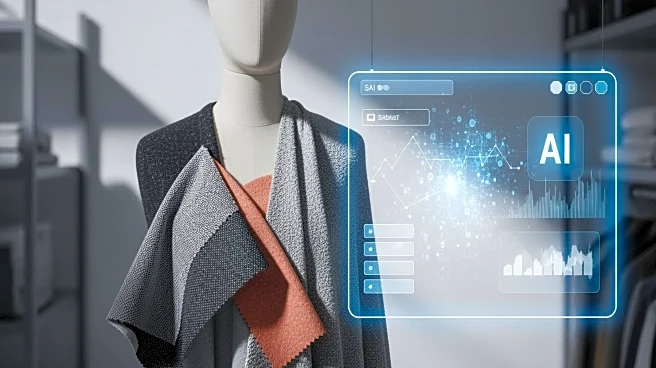What's Happening?
ThredUp, a leading secondhand apparel platform, is experiencing significant growth due to the impact of tariffs and advancements in artificial intelligence. The company processes approximately 40,000 pieces
of used clothing daily at its Suwanee, Georgia warehouse, which is part of a logistics network rivaling fast-fashion giants. The global secondhand apparel market is projected to reach $367 billion by 2029, driven by tariffs that increase retail prices and make resale platforms more attractive. ThredUp's CEO, James Reinhart, reports a 34% revenue growth year-over-year and a 54% increase in new buyers. AI technology is crucial for ThredUp, enhancing garment categorization and pricing, and improving buyer personalization. This trend is supported by fashion-tech startups like Phia, which use AI to optimize shopping experiences.
Why It's Important?
The rise of secondhand shopping, accelerated by tariffs and AI, is reshaping the U.S. fashion industry. As tariffs increase retail prices, consumers are turning to resale platforms for more affordable options. This shift benefits companies like ThredUp, which are leveraging AI to enhance operational efficiency and customer experience. The trend towards secondhand shopping aligns with growing consumer demand for sustainable fashion, potentially leading to a more environmentally friendly industry. The success of ThredUp and similar platforms indicates a significant change in consumer behavior, with implications for traditional retail and manufacturing sectors.
What's Next?
ThredUp plans to continue expanding its operations and leveraging AI to improve its services. The company is betting on domestic infrastructure and automation to maintain its competitive edge. As tariffs continue to affect retail prices, the secondhand market is likely to grow further, attracting more consumers seeking cost-effective and sustainable shopping options. The broader fashion industry may need to adapt to these changes, potentially leading to increased investment in technology and sustainability initiatives.
Beyond the Headlines
The shift towards secondhand shopping raises ethical and cultural questions about consumerism and sustainability. As more consumers embrace resale platforms, the fashion industry may face pressure to adopt more sustainable practices. This trend could lead to a reevaluation of the industry's environmental impact and encourage innovation in sustainable fashion solutions.










